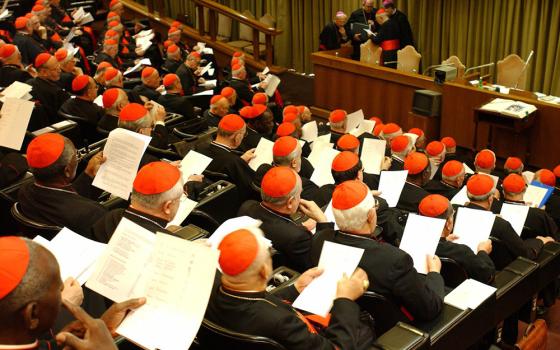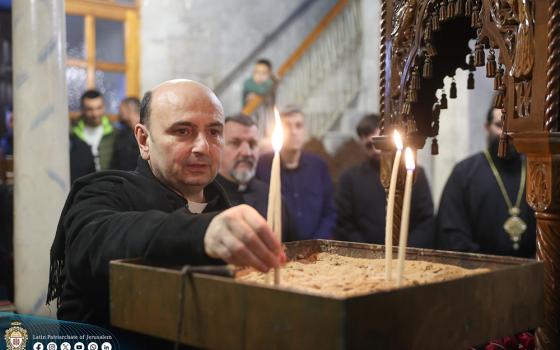FORT WORTH, Texas -- The Catholic Church serves "all who come our way because we are Catholic," Bishop Kevin W. Vann of Fort Worth told participants at Catholic Charities USA's first Poverty Summit and National Gathering.
"We repeatedly emphasize that our mission to serve all in need comes from the fact that we are Catholic," Bishop Vann said, "and that since one of the marks of the church is "universal,' that applies to our call to ministry and mission here. We are who we are."
He made the remarks in his homily at the Sept. 18 Mass opening the two-day summit.
That universal group served by Catholic Charities and its partner agencies is growing.
Carol Quasula is dealing with a new kind of poverty. She's accustomed to helping the generational poor -- children of parents with no resources or money who grow up to live in poverty themselves. But the families now walking through her door at Catholic Charities in rural Cottonwood, Ariz., about 35 miles outside Flagstaff, are used to having jobs, a paycheck and a modest lifestyle.
A rise in mortgage foreclosures stopped new home projects in the area, and the loss of construction work means more people are slipping into poverty.
"They've lost jobs, unemployment benefits have run out, and they come to me humbly asking for assistance," explained Quasula told the North Texas Catholic, Fort Worth's diocesan newspaper.
Need in the community is growing at a time when services and staff at the site's small Catholic Charities office are at an all-time low.
"Funding for nonprofits is drying up and becoming highly competitive," she added.
On the other side of the country, Joseph Ransom sees a different kind of poverty crisis. Finding affordable shelter for the homeless in New York City is almost impossible, he says.
"We clearly don't have the necessary housing, and there's no space to build any," he said.
The executive director of the St. Raymond's Outreach Center in the Bronx hires part-time employees who live in the local shelter with their children. Limited funds prevent him from having a large, full-time staff.
"They're poor. The money I pay helps sustain them," explained Ransom, who believes government bureaucracy often works against homelessness. "At the same time, these are the people who are serving the other poor."
Both social service advocates were among the 600 participants attending the inaugural Poverty Summit held Sept. 18-19 in Fort Worth.
Hosted by Catholic Charities USA in conjunction with nine nonprofit partners, the groundbreaking event brought together people from around the country with the intention of forming initiatives to reduce poverty in America and protect federal funding of programs that assist the poor.
The Poverty Summit served as the first two days of Catholic Charities annual gathering, which continued with programming and workshops Sept. 20 and 21.
In opening remarks, Father Larry Snyder, president of Catholic Charities USA, reminded summit participants that they are the voice of single mothers, homeless veterans and the others who have been pushed to the corners of society.
There are currently 46 million Americans living in poverty, and one of every five children deals with food insecurity. Poverty also is linked to diabetes, heart disease and failing grades in school.
"Let us bring our collective creativity, compassion, and energy to search together for solutions that will improve the lives of so many, while creating a more compassionate and just society," he asked. "If we can do that, our first annual Poverty Summit will be a success."
Last year, Catholic Charities USA served more than 10 million people in the areas of nutrition, health care, housing, disaster relief, and others. Feeding America and Save the Children -- two of the Poverty Summit's organizing partners -- also have done their share, Father Snyder pointed out.
More than 27 million Americans benefited from Feeding America's food bank network and Save the Children provided high-quality early childhood development, literacy and physical activity programs to 21,000 youngsters from underserved, rural communities across the country.
Other nonprofit sponsors included the American Campaign for Human Development, Bread for the World, the Corporation for Enterprise Development, the Coalition on Human Needs, the National Alliance to End Homelessness, and the Society of St. Vincent de Paul.
"We live in the richest country in the world, even with our deficit challenges, and yet the vast majority of the country is content to go to bed at night without thought for the one out of every six Americans who are struggling simply to get by," said Father Snyder. "That has to change. And it's up to us to change it."
The following day, experts who work on the front lines of homelessness, hunger, and economic opportunity, engaged in a vigorous discussion on how to reduce poverty in America.
Moderated by John Bridgeland, CEO of Civic Enterprises, the panel included the Rev. David Beckmann, president of Bread for the World; Andrea Levere, president of the Corporation for Enterprise Development; and Nan Roman, president and CEO of the National Alliance to End Homelessness.
Rev. Beckman addressed proposed cuts in the federal budget that affect the impoverished and homeless. Two-thirds of those cuts, he said, focused on programs such as Medicaid, tax credits for the working poor, and the Supplemental Nutrition Assistance Program.
"If the reduced cuts to SNAP become law, that will take away from poor people three times as much food as all the charitable food organizations in the country mobilize for the hungry," he pointed out.
A group of diverse Christian leaders, chaired by the U.S. Conference of Catholic Bishops, proposed forming a "circle of protection" around programs focused on the poor.
Roman, agreed the country's deficit is an issue, "but we can't deal with it on the backs of homeless, vulnerable people."



